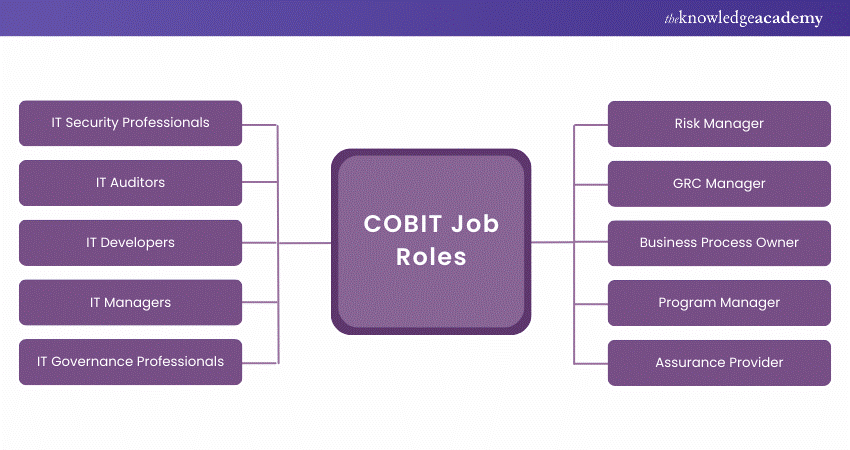We may not have the course you’re looking for. If you enquire or give us a call on +45 89870423 and speak to our training experts, we may still be able to help with your training requirements.
Training Outcomes Within Your Budget!
We ensure quality, budget-alignment, and timely delivery by our expert instructors.

Envision yourself as the vital force in a company’s IT ecosystem, ensuring that every aspect of digital operations runs smoothly and securely. Have you ever wondered what it feels like to be the architect behind perfect IT operations? With Control Objectives for Information and Related Technology (COBIT®), you're not merely managing technology; you're crafting the future of your organisation with COBIT® Jobs.
Are you ready to unlock new career possibilities and become a key player in IT Governance? Whether developing high-quality software or leading innovative programs, COBIT® Jobs opens numerous career opportunities. Let’s explore the diverse and dynamic roles that benefit from this robust framework and see how mastering COBIT® can elevate your career to new heights.
Table of Contents
1) What is COBIT®?
2) What is the COBIT® Framework?
3) 10 COBIT® Job Roles
a) IT Security Professionals
b) IT Auditors
c) IT Developers
d) IT Managers
e) IT Governance Professionals
f) Risk Manager
g) GRC Manager
h) Business Process Owner
i) Program Manager
j) Assurance Provider
4) Conclusion
What is COBIT®?
Control Objectives for Information and Related Technology is a framework developed by the Information Systems Audit and Control Association (ISACA). It serves as a valuable tool for Managers, helping to bridge the critical gap between technical challenges, business risks, and control requirements.
Widely recognised and applicable across various industries, COBIT® ensures the quality, control, and reliability of an organisation’s information systems. This is crucial for the success of any modern business.
What is the COBIT® Framework?
The COBIT® framework is designed to help organisations achieve their goals for IT Governance and Management. It provides a structured approach to managing and governing IT enterprises, ensuring that IT investments support business objectives.
The framework includes principles, policies, processes, organisational structures, culture, ethics, information, services, infrastructure, and applications. COBIT®'s process model covers IT activities: planning, organising, acquiring, implementing, delivering, supporting, monitoring, and evaluating.
Enhance your IT skills—join our comprehensive IT Support and Solution Training today!
10 COBIT® Job Roles
COBIT®'s versatility means it can be applied to a wide range of job roles within the IT field. Here are ten key roles where COBIT® is particularly valuable:

1) IT Security Professionals
IT security professionals use COBIT® to establish a comprehensive security framework that aligns with the organisation's objectives. They ensure that security measures are integrated into the IT Governance structure and that risks are managed effectively. COBIT® helps these professionals by providing guidelines for securing information and technology assets, thereby minimising vulnerabilities and potential threats.
2) IT Auditors
IT Auditors leverage COBIT® to perform thorough audits of an organisation's IT environment. COBIT®'s detailed guidelines and control objectives help auditors assess the effectiveness of IT controls, ensure compliance with policies and regulations, and provide recommendations for improvements. This framework enables auditors to identify gaps in processes, mitigate risks, and enhance the overall control environment.
3) IT Developers
IT Developers benefit from COBIT® by integrating its best practices into the software development lifecycle. COBIT® provides a structured approach to managing and controlling development projects, ensuring that software solutions align with business goals. Developers use COBIT® to establish clear requirements, manage changes effectively, and ensure that the end product meets quality standards and compliance requirements.
4) IT Managers
IT Managers use COBIT® to oversee and manage IT operations, ensuring that they align with the strategic goals of the organisation. COBIT® helps Managers implement effective governance practices, optimise resource utilisation, and improve service delivery. By following COBIT® guidelines, IT Managers can enhance decision-making processes, manage risks, and ensure that IT initiatives contribute to business value.
5) IT Governance Professionals
IT Governance Professionals rely on COBIT® to establish a robust governance framework that ensures IT aligns with business objectives. COBIT® provides a structured approach to defining roles and responsibilities, setting objectives, and monitoring performance. Governance professionals use COBIT® to create policies and procedures that drive accountability, transparency, and effective Risk Management across the organisation.
Enhance your IT knowledge—sign in to our IT Fundamentals Training today!
6) Risk Manager
Risk Managers utilise COBIT® to identify, assess, and mitigate risks associated with IT operations. COBIT®'s Risk Management framework helps these professionals implement controls that reduce the likelihood and impact of potential threats. By following COBIT® guidelines, Risk Managers can develop a comprehensive Risk Management strategy that aligns with the organisation's risk appetite and ensures business continuity.
7) GRC Manager
Governance, Risk, and Compliance (GRC) Managers use COBIT® to integrate governance, Risk Management, and compliance activities into a cohesive framework. COBIT® provides a structured approach to managing GRC activities, ensuring that they align with business objectives and regulatory requirements. GRC Managers leverage COBIT® to streamline processes, reduce redundancies, and enhance the overall effectiveness of GRC initiatives.
8) Business Process Owner
Business Process Owners utilise COBIT® to ensure that IT processes align with business objectives and support efficient operations. COBIT® provides guidelines for designing, implementing, and monitoring IT processes, ensuring they deliver value to the organisation. By following COBIT® principles, Business Process Owners can optimise workflows, improve performance, and ensure that IT initiatives contribute to achieving business goals.
9) Program Manager
Program Managers use COBIT® to oversee and manage IT programs, ensuring they align with the organisation's strategic objectives. COBIT® provides a structured approach to managing program activities, from planning and execution to monitoring and evaluation. Program Managers use COBIT® to ensure timely, budget-compliant, quality projects, maximising IT investment value.
10) Assurance Provider
Assurance Providers, including auditors, use COBIT® to evaluate IT controls and processes. COBIT®'s framework aids in assessments, identifying gaps, and recommending improvements. It ensures IT operations comply with regulations, mitigate risks, and enhance the overall control environment.
Jumpstart your IT career by joining our COBIT®® Foundation Training today!
Conclusion
Mastering COBIT® can transform your career, opening doors to vital roles in IT Governance and Management. With COBIT®, you'll ensure seamless and secure digital operations, align IT with business goals, and drive innovation. Embrace COBIT® Jobs to become a key player in shaping the future of technology within organisations.
Elevate your IT potential—sign up for our COBIT®® Training now and drive business success!
Frequently Asked Questions

Industries that value COBIT® expertise the most include finance, healthcare, telecommunications, and government. These sectors prioritise robust IT Governance, Risk Management, and regulatory compliance, making COBIT® essential for ensuring secure, efficient, and compliant digital operations.

A career in COBIT® requires skills in IT Governance, Risk Management, and compliance. Proficiency in process optimisation, auditing, and Project Management is essential. Additionally, strong analytical abilities, effective communication, and knowledge of regulatory standards are crucial for success.

The Knowledge Academy takes global learning to new heights, offering over 30,000 online courses across 490+ locations in 220 countries. This expansive reach ensures accessibility and convenience for learners worldwide.
Alongside our diverse Online Course Catalogue, encompassing 17 major categories, we go the extra mile by providing a plethora of free educational Online Resources like News updates, Blogs, videos, webinars, and interview questions. Tailoring learning experiences further, professionals can maximise value with customisable Course Bundles of TKA.

The Knowledge Academy’s Knowledge Pass, a prepaid voucher, adds another layer of flexibility, allowing course bookings over a 12-month period. Join us on a journey where education knows no bounds.

The Knowledge Academy offers various COBIT® Training, including COBIT®® Foundation. This course cater to different skill levels, providing comprehensive insights into COBIT® 5 Principles.
Our IT Service Management Blogs cover a range of topics related to COBIT®, offering valuable resources, best practices, and industry insights. Whether you are a beginner or looking to advance your IT Service skills, The Knowledge Academy's diverse courses and informative blogs have got you covered.
Upcoming IT Service Management Resources Batches & Dates
Date
 COBIT® Foundation
COBIT® Foundation
Thu 6th Mar 2025
Thu 12th Jun 2025
Thu 4th Sep 2025
Thu 13th Nov 2025







 Top Rated Course
Top Rated Course



 If you wish to make any changes to your course, please
If you wish to make any changes to your course, please


